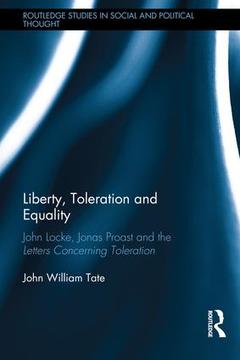Description
Liberty, Toleration and Equality
John Locke, Jonas Proast and the Letters Concerning Toleration
Routledge Studies in Social and Political Thought Series
Author: Tate John William
Language: English
Subject for Liberty, Toleration and Equality:
Keywords
John Locke; Jonas Proast; Toleration; Liberalism; Letters Concerning Toleration; Political Philosophy; Political Theory; History of Ideas; Religion; John Tate; Richard Vernon; Adam Wolfson; Effective State Governance; Epistola De Tolerantia; Magistrate’s Command; Consent Argument; Locke’s Political Philosophy; Civil Society; Proast’s Response; Locke’s Letter; Civil Peace; Civil Perspective; True Religion; Locke’s Scepticism; Indubitable Criterion; Proast’s Position; Truth Argument; Genuine Religious Belief; Locke’s Composition; Locke’s Conception; Locke’s Engagement; Charlie Hebdo Shooting; Magistrate’s Authority; Locke’s Proposition; Earlier Errors; Locke’s Response
Publication date: 06-2016
· 15.2x22.9 cm · Hardback
Publication date: 05-2018
· 15.2x22.9 cm · Paperback
Description
/li>Contents
/li>Readership
/li>Biography
/li>
The seventeenth century English philosopher, John Locke, is widely recognized as one of the seminal sources of the modern liberal tradition. Liberty, Toleration and Equality examines the development of Locke?s ideal of toleration, from its beginnings, to the culmination of this development in Locke?s fifteen year debate with his great antagonist, the Anglican clergyman, Jonas Proast. Locke, like Proast, was a sincere Christian, but unlike Proast, Locke was able to develop, over time, a perspective on toleration which allowed him to concede liberty to competing views which he, personally, perceived to be "false and absurd". In this respect, Locke sought to affirm what has since become the basic liberal principle that liberty and toleration are most significant when they are accorded to views to which we ourselves are profoundly at odds.
John William Tate seeks to show how Locke was able to develop this position on toleration over a long intellectual career. Tate also challenges some of the most prominent contemporary perspectives on Locke, within the academic literature, showing how these fall short of perceiving what is essential to Locke?s position.
Introduction
Chapter 1: Locke, Liberty and Governance
Chapter 2: From Conformity to Toleration – Matters of Influence
Chapter 3: From Conformity to Toleration – Matters of Argument
Chapter 4: Locke in the Dock
Chapter 5: Three "Considerations" for Toleration
Chapter 6: Locke vs. Proast
Chapter 7: Proast’s Response: "True Religion and the Salvation of Souls"
Chapter 8: Locke’s Reply: "That which without Impiety Cannot be Said"
Chapter 9: Locke, Scepticism and Consent
Chapter 10: Locke’s "Civil Perspective"
Chapter 11: Conclusion
John William Tate is Senior Lecturer in Politics at The University of Newcastle, Australia. His primary research expertise is in the area of political philosophy and history of political thought.
These books may interest you

The Lockean Mind 250.90 €



